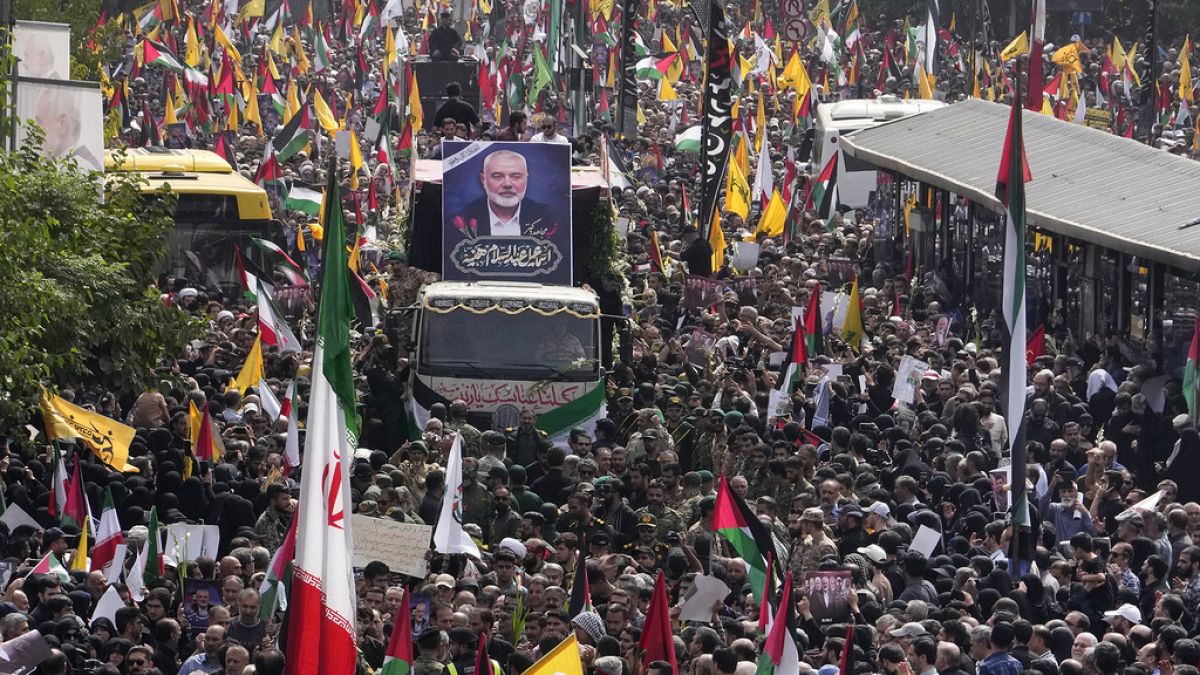After the funeral service in Tehran, Ismail Haniyeh’s remains are expected to be transferred on Friday to Qatar for burial where he lived in exile.
Hundreds of thousands of people attended a funeral procession and service for top Hamas leader Ismail Haniyeh in Tehran on Thursday.
The procession was held in the streets of the Iranian capital, where Haniyeh’s coffin was carried through the city in an ornate vehicle.
Iran’s supreme leader, Ayatollah Ali Khamenei, led funeral prayers at Tehran University while Iran’s new President, Masoud Pezeshkian, stood next to him.
After the funeral services in Tehran, Haniyeh’s remains were expected to be transferred to Qatar for burial, where he lived in exile for years.
Haniyeh travelled to Tehran to attend the inauguration of the country’s new president, Pezeshkian. He was killed in an airstrike that struck a residence he used in the city.
Iranian authorities said the attack is under investigation but have not released further details.
The strike came just hours after Israel targeted a top commander of Iran’s ally Hezbollah in the Lebanese capital, Beirut.
Israel had pledged to kill Haniyeh and other Hamas leaders over the group’s October 7 attack on southern Israel that sparked the war in Gaza.
Fears of wider war in the Middle East
The assassination was potentially explosive amid the region’s volatile, intertwined conflicts because of its target, its timing, and the decision to carry it out in Tehran.
Most dangerous was the potential to push Iran and Israel into direct confrontation if Iran retaliates. The US and other nations scrambled to prevent a wider, deadlier conflict.
In a statement on his official website, Iranian supreme leader Ayatollah Ali Khamenei said revenge was “our duty” and that Israel had “prepared a harsh punishment for itself” by killing “a dear guest in our home.”
Bitter regional rivals, Israel and Iran, risked plunging into war earlier this year when Israel hit Iran’s embassy in Damascus in April.
Iran retaliated, and Israel countered in an unprecedented exchange of strikes on each other’s soil, but international efforts succeeded in containing that cycle before it spun out of control.
Haniyeh’s killing is, however, prompting fears that Hamas may pull out of negotiations for a ceasefire and hostage release deal in the 10-month-old war in Gaza, which US mediators had said were making progress.
Before Haniyeh’s assassination, Israel carried out a rare strike on Tuesday evening in the Lebanese capital that it said killed a top Hezbollah commander allegedly behind the rocket strike.
Hezbollah, which denied any role in the Golan strike, confirmed the death of Fouad Shukur on Wednesday, saying he was in the building that was hit.
The strike also killed three women and two children, according to the Lebanese Health Ministry.

